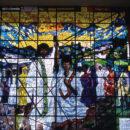What Future for Africa? – by Stephen Ellis

 Africa is now more important than at any time in the last fifty years. You would never think so, to judge from the small-minded attitude of European publics and the shallow generation of politicians they have voted into office.
Africa is now more important than at any time in the last fifty years. You would never think so, to judge from the small-minded attitude of European publics and the shallow generation of politicians they have voted into office.
Africa is a major source of commodities for the new industrial powers of Asia. Many of these new-old powers distrust world markets and “” quite rightly “• believe that the leading global financial institutions do not always pay due regard to their interests. With China in the lead, new Asian players as well as Brazil and others are keen to establish durable influence over the sources of the commodities they need. This means giving attention to Africa, shaping the political context to their own requirements.
Furthermore, Africa now has over a billion people, the result of the fastest population growth in the world’s history. Thanks to mobile phones, the marketing departments of major companies are able to reach these consumers en masse for the first time.
This is not all. According to the Food and Agriculture Organisation, Africa contains 80% of the world’s currently unused agricultural land. Most of Africa’s share is in just three countries: Sudan, Congo and Angola. Agricultural production in Asia, Europe and North America cannot expand by much. If the world is to feed its growing number of people, the area under cultivation in Africa will have to be extended. How precisely this will happen will be one of the world’s great dramas over the next decades. Will it be done by African farmers on their own holdings, benefiting from more investment and higher-grade technology? Will it be done by creating new plantations in which Africans, or even labourers imported from Asia, work for wages? Will Africa be used primarily to grow biofuels for consumption in countries that have lost faith in oil? What will be the social and political consequences of any of these options? No one knows. But foreign investment in African farmland is proceeding at a rapid pace.
These, plus the possibility that foreign industrial manufacturers could start building factories in Africa, are some of the reasons for the upsurge in investment that makes Africa the world’s last major emerging market. The great interest for Africa being generated by the international financial press is not misplaced. It is, however, to be treated with due caution. Investors have a tendency to herd behaviour that stems not so much from stupidity as from the fundamental nature of money and of risk. It leads to the creation of financial bubbles that cause grief when they burst.
African investment could easily become a bubble because its countries find it hard to absorb capital. Capital is more than just money, but is an abstraction created by assessing the productive potential of the things people own. Where the institutions needed to make this assessment are lacking, capital will not stay. It will move to other places where the operation is more assured.
In this regard nothing is more important than the prevalence of what are often called “˜fragile’ states in Africa. Some of these could conceivably develop into more conventional states, but most will not. They have come into being through the erosion of the bureaucracies put in place in colonial times and their replacement by forms of government rooted in much older histories. “˜Fragile’ states of this sort exist not only in Africa but also in Afghanistan and Pakistan and elsewhere. Europeans and Americans would be foolish to regard countries like these simply as abject failures. Inhabitants of advanced capitalist countries need to work out how they can continue to live in a world where such places are becoming increasingly normal. After all, the current world order of sovereign states was put in place only in 1945. Small wonder that the arrangements made then are now showing their age as others did before them. In this sense the unravelling of bureaucratic states in Africa is an early sign of an emerging world system. It is a canary in a coal mine. What happens next will depend increasingly on decisions made by emerging powers, especially China. It has a traditional hostility to institutional forms of global imperialism but also an acute sense of its own interests.
I have been studying Africa for 40 years. I have noticed that Europe’s knowledge of Africa has now become quite thin, and European governments should be careful not to lose what little they have. Otherwise they will find themselves squandering the influence that they have acquired, at great cost in blood and treasure, both their own and that of others, over generations.
Stephen Ellis is author of Season of Rains: Africa in the World (Hurst & Co, 2011)





